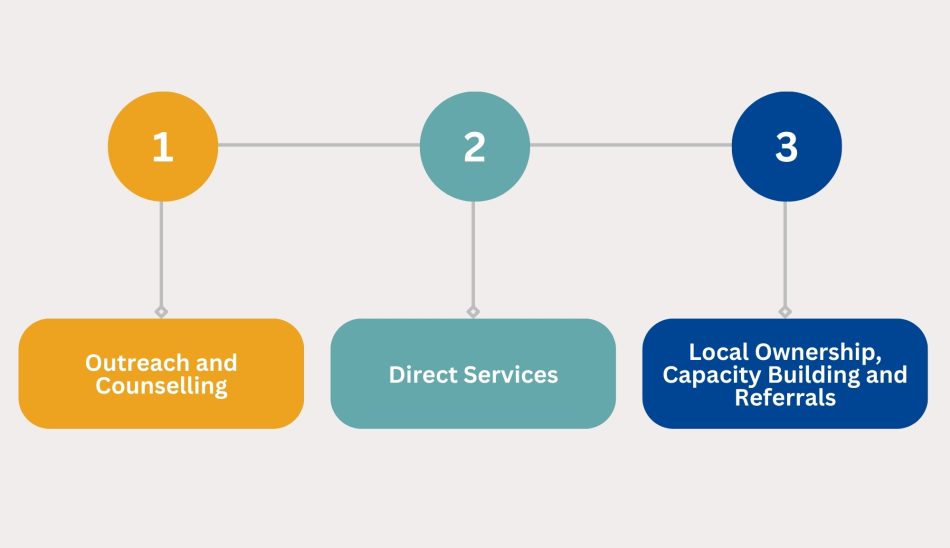Launched in 2022, the RRF focuses on all areas of return and reintegration. In fact, its work plan 2024 – 2025 is divided into three main thematic areas to reflect this and each aimed at achieving broader goals that align with the EU’s Common Return System, particularly the EU Assisted Voluntary Return and Reintegration (AVRR) Strategy. Learn more about each of these thematic work areas by reading below and exploring our website!
Thematic Area 1:
Counselling and Outreach: Empowering Migrants and Strengthening Return Processes
The first thematic area, Counselling and Outreach, focuses on enhancing the capacity of MS to provide effective return counselling services. The goal here is to contribute to establish robust return counselling mechanisms that cater to various migrant groups at different stages of their migration journey. This aims to enhance decision-making by providing migrants with the information they need to make informed choices and to empower MS to enforce return decisions more effectively.
Through this initiative, local and national stakeholders , including both governmental and non-governmental organisations, will receive support to improve their counselling capabilities. This ensures that migrants have access to accurate information, enabling them to make informed decisions about their return. Ultimately, this approach aims to empower migrants to take ownership of their migration paths, whether their return is voluntary or non-voluntary.
Key outputs of this work area include the development of guidelines, manuals, and training materials for return counsellors, the creation of expert groups, the collection of data on return intentions and migrant demographics, and the creation of information materials tailored for relevant stakeholders.
Thematic Area 2:
Direct Services: Contributing to Safe and Dignified Returns
The second work area, Direct Services, is designed to facilitate the procurement and management of specialised services for returnees, particularly those requiring medical care, and to provide direct financial support through innovative payment solutions in the framework of reintegration assistance.
The primary objective is to contribute to the ability of MS to conduct returns that prioritise the safety and dignity of individuals. By adopting these targeted services, MS can ensure that returnees receive the necessary medical and financial support throughout their return and reintegration processes.
Thematic Area 3:
Fostering Local Ownership by supporting cooperation among MS, national authorities in Countries of Origin, and other relevant stakeholders
The third work area emphasises the importance of cooperation between the EU, MS, and Countries of Origin (CoO) to ensure sustainable reintegration for returnees. This area is based on the understanding that ownership of the reintegration process must ultimately lie with the countries whose citizens are returning from the EU. The non-European countries involved in this work area reflect migration dialogue priority countries, as well as those where EU added value is evident in MS engagement.
This initiative seeks to strengthen dialogue and collaboration with national and local authorities, civil society, and development actors in CoO. The aim is to foster local ownership of reintegration processes, ensuring that these efforts are sustainable and tailored to the specific needs of each country.
Key outputs of this work area include the assessment of reception capacities at selected CoO airports of high interest for the EU, the maintenance of service catalogues and referral processes, the use of the Technical Working Group Return & Development platform to guide the implementation of the operational framework, and the provision of complementary reintegration services. Furthermore, training and capacity building activities will be conducted to bolster local capacities within specific frameworks and contexts.
The RRF Workplan 2024-2025 represents a comprehensive and collaborative approach to managing migration in the EU. By focusing on these three thematic work areas — Counselling and Outreach, Direct Services, and Fostering Local Ownership, Capacity Building and Referrals — the RRF is poised to support MS in achieving effective, humane, and sustainable outcomes in return and reintegration efforts.
As the EU continues to navigate the complexities of migration, the initiatives outlined in this workplan will play a crucial role in shaping the future of migration management across the continent.

